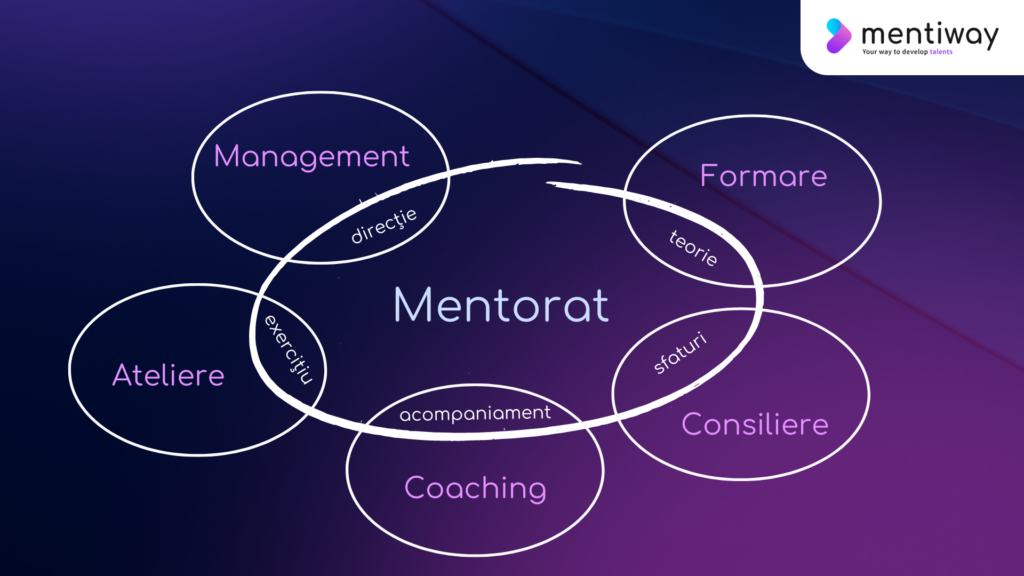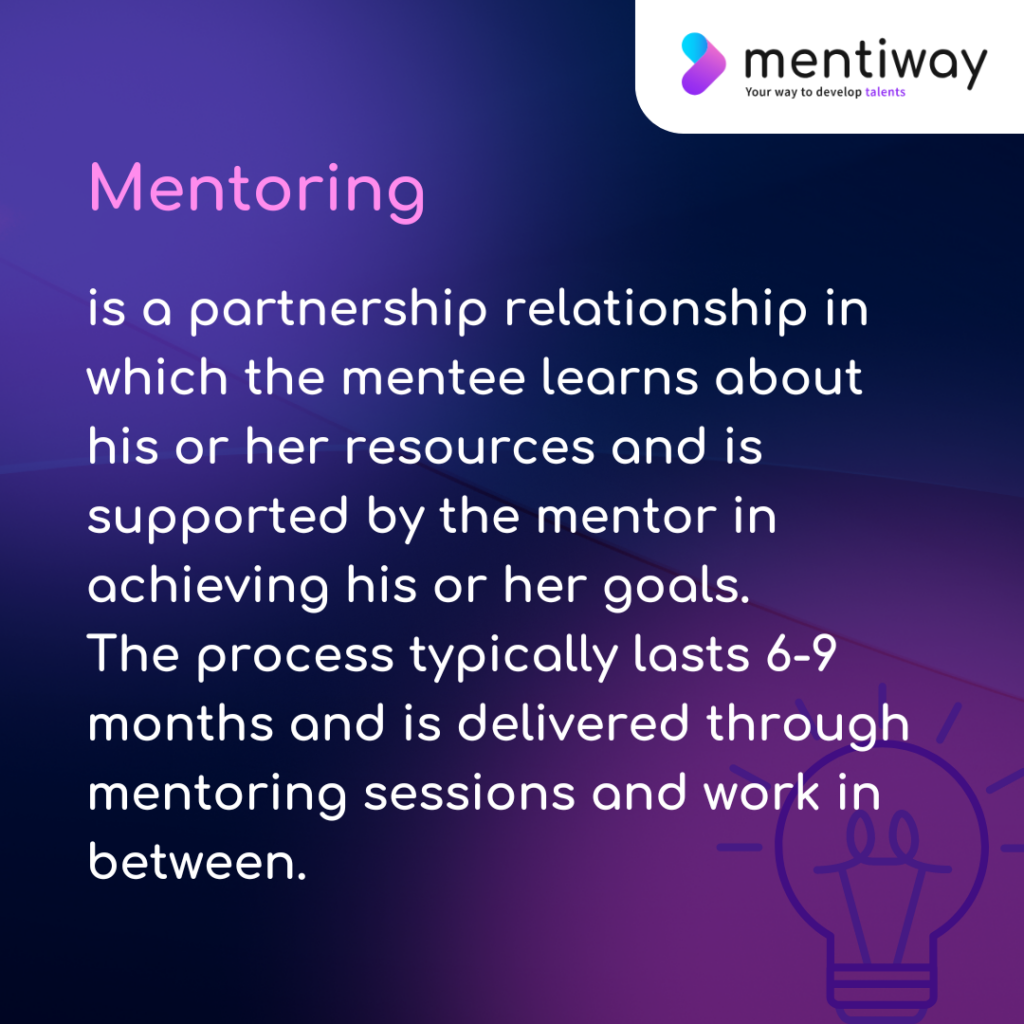Mentee – what does it mean? Role, responsibilities, competencies and benefits
On the blog so far, we have paid a lot of attention to the principles of mentoring and the role and responsibilities of the Mentor. Now it’s time to take a closer look at the other side of the mentoring relationship, the Mentee.
In this article I have gathered the most important information about what the Mentee role is about, what are the requirements for this role, but also what benefits such a role entails and how to start your mentoring adventure just by being on the Mentee side.
I invite you to read more.
Who is a Mentee?
In the simplest terms, based on a basic definition, Mentee is simply a mentee. A person who has less experience and knowledge in a chosen area, who wants to develop and does so under the guidance of a Mentor.
In practice, however, as in the case of mentoring itself, which is governed by certain rules, the Mentee position also involves several assumptions and requirements.
The role of a Mentee is described below. Here I would just like to point out that being a Mentee, is not the same as being a participant in a training or workshop. The role of a Mentee is much more active than just accepting the knowledge being imparted and involves involvement and a fair amount of your own work, including between sessions.
Mentoring is not training, and a Mentee is a mentee, not a trainee.

Mentee’s role in the mentoring process
The role of Mentee is described in more detail in the article: I want to be a Mentee, make sure you know what it entails.
We mentioned there that the Mentee’s role is first and foremost:
- Building self-awareness – learning about your resources and limitations, your motivations, analyzing your own behavior and beliefs,
- Learning – development of knowledge and skills,
- Implementation of goals set together with the Mentor.

To understand the Mentee’s role, it is also necessary to understand what mentoring is. It is a partner relationship and process in which the Mentee gets to know himself/herself, learns and tries to put into practice the knowledge learned, supported by the Mentor, achieving the goals.
The important thing is that mentoring requires a lot of activity on the part of the Mentee. As I mentioned above, it is not training, where the Mentee with passive participation receives a certain amount of knowledge. But it’s also not consulting, where the Mentor suggests specific solutions to the problems presented.
The main premise of mentoring is the conscious and active development of the Mentee. And the Mentor is a companion here. Sometimes he will share knowledge, sometimes he will hint something, but most of all his task is to motivate the Mentee to do his own work, to learn about his own resources, needs, to find his own solutions.
The role of the Mentee in practice
In practice, mentoring is implemented in two spaces:
- During mentoring sessions,
- and during the Mentee’s own work between sessions.
A mentoring session is simply a meeting between Mentor and Mentee, lasting from 60 to 120 minutes, during which the pair works together on a predetermined topic. During the session, the Mentor may use a variety of coaching and mentoring techniques. Most often, however, the work involves the Mentor analyzing a given challenge and asking questions, and often the Mentor sharing his or her own experience.
Mentee’s own work between sessions consists of performing set tasks, which may involve gathering information, thinking about or analyzing issues, or consciously applying the methods or techniques discussed during the session in practice.
So, in practice, the Mentee consciously and with commitment discusses selected issues with the Mentor during the sessions, acquires knowledge from him and tries to put it into practice. The whole process takes several mentoring sessions and should end with an evaluation of the goals set.
Hi, my name is Thomas. I am the Co-Founder of Mentiway. We are happy to share our knowledge and support organisations on their way to success! 💪 If you are interested in how to efficiently and effectively implement a mentoring programme in your organisation using technology:


Key competencies and requirements for Mentee
Given the above outlined role of the Mentee, in order to successfully go through the mentoring process the Mentee must first of all:
- be motivated,
- Be involved and attentive,
- Initiate contact with the Mentor, be a proactive party in the process,
- Be open to a different point of view and to new ideas, concepts, attempts at behavior, take challenges, test, try,
- Learn from successes and failures,
- Have a willingness to self-reflect, to think about their own behavior, thoughts and feelings.
Only such an attitude makes it possible to realize the mentoring process in a way that is effective and efficient for both parties.
Commitment and motivation
The mentoring process is not just occasional meetings with the Mentor. As I wrote above, in order to achieve the desired goals, it is necessary for the Mentee to work actively between sessions. This means preparation for meetings, reflection on “homework” and time for reflection.
Commitment requires carving out enough time in the calendar to take full advantage of the process. It is important for the Mentee to consider whether he or she will be able to devote enough time given his or her other commitments.
Mentee responsibility
The Mentee must remember that the Mentor will not complete the goals for him/her. It is the Mentee who is responsible for progress and initiative in the process. The Mentor will be supportive, but cannot act on behalf of the Mentee or force him/her to do anything.
For this reason, responsibility for any failures cannot be placed on the Mentor. It is the Mentee who makes the key decisions and is responsible for the results.
Honesty and openness
In addition, the Mentee should be aware that in a mentoring relationship honesty and openness are essential. Sometimes the Mentee will hear positive information, but also information that may surprise him. It is important that he or she be ready for this.
Benefits of being a Mentee
Mentoring as a development method has a myriad of benefits. In fact, for each party. The entire organization/company benefits from the implementation of a mentoring program. The Mentor also benefits from the implementation of the process. And, of course, the Mentee also benefits greatly from the mentoring work.
We have previously written about the benefits of being a Mentee. There we wrote about the fact that surveys regularly conducted around the world among people who use forms of development such as coaching and mentoring indicate the following subjective feelings resulting from being a Mentee:
- Greater confidence
- Increase self-confidence
- Support received on a regular basis
- A sense of being recognized and valued
- Greater clarity of professional and personal goals
- Receive assistance in career development
- Increase chances of promotion
- Development of selected skills and competencies
- Learning new skills and competencies
- Increased self-awareness and insight
- Receive many useful tools for your own work
- Help to find time just for yourself
Mentoring is a space for development and growth in areas the Mentee cares about. This can be the development of specific substantive skills and the development of specific soft skills and competencies.
The mentoring process in its concept also provides a very safe place to clash your thoughts, to have an experienced sparring partner on the other side, to experiment, to try, to make mistakes, to fall but also to pick yourself up and enjoy the successes.
Having a non-judgmental and at the same time supportive person by her side gives Mentee wings and definitely motivates her to act.
How to get started as a Mentee
Hopefully, you already know what benefits mentoring brings to Mentee, but also what responsibilities this role entails. If you are still interested in this form of development, you have several options.
The first is to search for open mentoring programs on the Internet, using phrases such as “mentoring program” or “apply as a mentee.” While many recruitments may already be closed, it’s a good idea to make a note of interesting programs and apply when new enrollments start.
Another option is to join industry organizations such as Women in Law, Work Mom or Dare IT. These institutions often offer mentoring programs for their participants.
The last option is to contact the employer (manager or HR department) or the university’s career office to inquire about the availability of mentoring programs. If they don’t have them, it’s worth suggesting the launch of such a project; grassroots initiatives can encourage companies to introduce their own programs.
Participation in mentoring does not require specialized knowledge or experience. What is key is an understanding of mentoring and a commitment to personal development.
Everyone can become a Mentee.
Hi, my name is Thomas. I am the Co-Founder of Mentiway. We are happy to share our knowledge and support organisations on their way to success! 💪 If you are interested in how to efficiently and effectively implement a mentoring programme in your organisation using technology:








